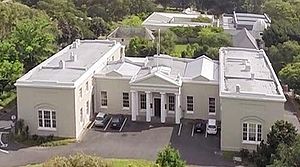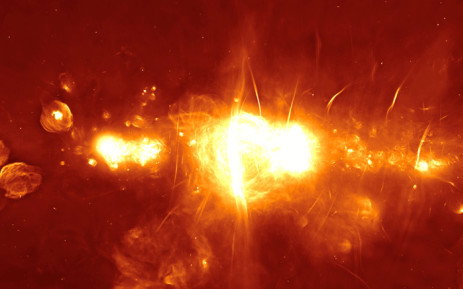Astronomy in Africa
Astronomy and Africa have a rich and long-standing relationship that dates back millennia. Ancient Egypt was a world leader in astronomy for many centuries, especially thanks to the School of Alexandria. During the Islamic era, Cairo’s Ibn Yunus Observatory was at the forefront of astronomical research in the 10th century.

Main Building of the Royal Observatory in Cape Town, venue for the Business Meeting for Astronomy in Africa (Credit: Wikipedia).
Starting from the eighteenth century, Africa’s unique geographical importance to global astronomy was recognized by the rest of the world. The Royal Observatory in the Cape of Good Hope was established in 1820, while in the following decades the world class Bouzareah Observatory was established at Algiers in North Africa. Algeria was also a main contributor to the “Carte du Ciel” project, that is the first worldwide astronomical project in history. Since then, Africa’s contributions to global human knowledge have both independently and collaboratively grown from strength to strength.
The beginning of the 21st century has seen a renewal of Africa’s strong heritage of astronomical excellence. Developments have spanned the whole continent, from the Mediterranean regions to the Sub-Saharan countries. Today Africa is home to both the largest single optical telescope (SALT) and the largest and most powerful radio telescope (MeerKAT) in the southern hemisphere. The continent will also play host to a large part of the international Square Kilometre Array (SKA) Project, with nine African countries contributing to the SKA network with radio telescopes, and providing scientists with the world’s most advanced radio astronomy array: these are Botswana, Ghana, Kenya, Madagascar, Mauritius, Mozambique, Namibia, South Africa and Zambia.

Clearest view yet of the centre of the Milky Way, taken by the Meerkat radio telescope (credit: SARAO; July 2018).
The continent is also host to the world-renowned HESS observatory in Namibia, and is developing the very exciting African Very Long Baseline Interferometry Network (AVN). A number of countries are rapidly developing their own astronomy programmes and instruments: examples include the Entoto Observatory and Research Centre in Ethiopia; the refurbished Kottamia Astronomical Observatory in Egypt; the 32m radio telescope observatory in Ghana; Oukaimeden Observatory in Morocco; a 1m optical telescope in Burkina Faso.
At the same time, the training of scientists and astronomers in Africa has come a long way. Many universities have introduced competitive degrees for young students fascinated by the field, such as the Master’s programme in Astronomy introduced in Uganda and the one in Astrophysics introduced in Algeria. At research level, Nigeria has launched many radio astronomy initiatives, while the establishment of the East African Astronomical Research Network (EAARN) is supporting the training of astrophysicists in the region by relying mostly on local expertise. Several of these projects – and other independent ones – include the development of data processing infrastructure and skills as part of their astronomical activities. These data infrastructures (such as good connectivity and computational clusters) can also be used to serve a broader audience outside astronomy, and are thus an excellent developmental outcome of the growth of Astronomy in Africa.
It is clear that the historical and geographical affinity between Africa and the field of astronomy provide the continent with a unique opportunity to further the advancement of global astronomical research in the twenty-first century. Recent developments in infrastructure and worldwide collaborations, coupled with a growing number of locally-formed professional scientists, call for a pan-African conference to coordinate and direct the continent’s astronomers in the future.